Small overlap front: driver-side
Rating applies to 2003-14 models
Tested vehicle: 2014 Volvo XC90 3.2 4-door 4wd
The Volvo XC90 was introduced in the 2003 model year.
| Evaluation criteria | Rating |
|---|---|
| Structure and safety cage | |
| Driver injury measures | |
| Head/neck | |
| Chest | |
| Hip/thigh | |
| Lower leg/foot | |
| Driver restraints and dummy kinematics | |

Action shot taken during the small overlap frontal crash test.

The dummy's position in relation to the door frame, steering wheel, and instrument panel after the crash test indicates that the driver's survival space was maintained very well.
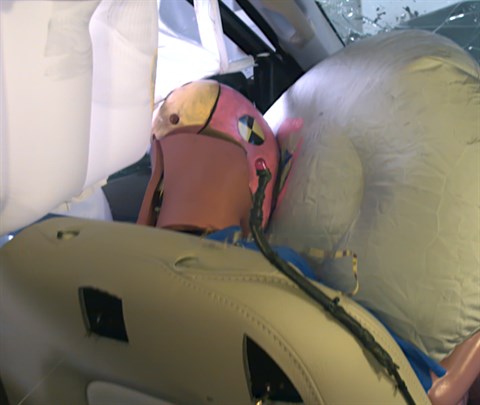
The frontal and side curtain airbags worked well together to protect the head from injury in the crash test. Still, the curtain airbag should extend farther forward toward the A-pillar to protect the head from contact with forward side structure and outside objects if crash circumstances were to differ slightly.
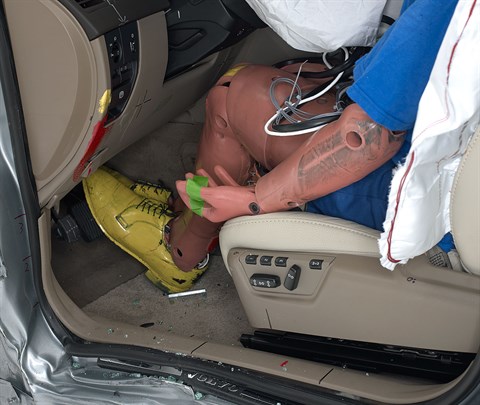
Intrusion into the driver's space was minimal, and risk of injuries to the dummy's legs and feet was low.
Measures of occupant compartment intrusion on driver side
| Evaluation criteria | Measurement |
|---|---|
| Test ID | CEN1336 |
| Lower occupant compartment | |
| Lower hinge pillar max (cm) | 7 |
| Footrest (cm) | 4 |
| Left toepan (cm) | 3 |
| Brake pedal (cm) | 4 |
| Parking brake (cm) | 7 |
| Rocker panel lateral average (cm) | 3 |
| Upper occupant compartment | |
| Steering column | 1 |
| Upper hinge pillar max (cm) | 5 |
| Upper dash (cm) | 4 |
| Lower instrument panel (cm) | 4 |
Driver injury measures
| Evaluation criteria | Measurement |
|---|---|
| Test ID | CEN1336 |
| Head | |
| HIC-15 | 62 |
| Peak gs at hard contact | no contact |
| Neck | |
| Tension (kN) | 0.8 |
| Extension bending moment (Nm) | 7 |
| Maximum Nij | 0.19 |
| Chest maximum compression (mm) | 24 |
| Femur (kN) | |
| Left | 3.2 |
| Right | 0.1 |
| Knee displacement (mm) | |
| Left | 7 |
| Right | 0 |
| Knee-thigh-hip injury risk (%) | |
| Left | 1 |
| Right | 0 |
| Maximum tibia index | |
| Left | 0.44 |
| Right | 0.44 |
| Tibia axial force (kN) | |
| Left | 0.6 |
| Right | 0.5 |
| Foot acceleration (g) | |
| Left | 42 |
| Right | 35 |
Moderate overlap front: original test
Rating applies to 2003-14 models
Tested vehicle: 2003 Volvo XC90 4-door 4wd
The Volvo XC90 was introduced in the 2003 model year.
| Evaluation criteria | Rating |
|---|---|
| Overall evaluation | |
| Structure and safety cage | |
| Driver injury measures | |
| Head/neck | |
| Chest | |
| Leg/foot, left | |
| Leg/foot, right | |
| Driver restraints and dummy kinematics | |
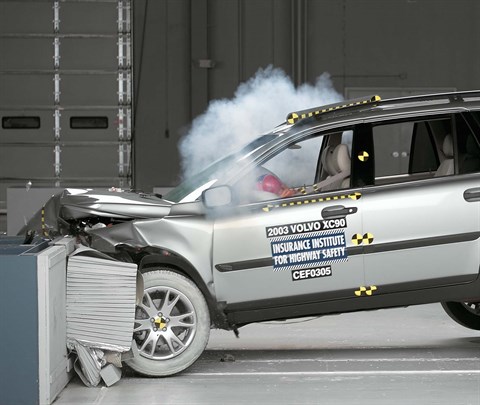
Action shot taken during the frontal offset crash test.
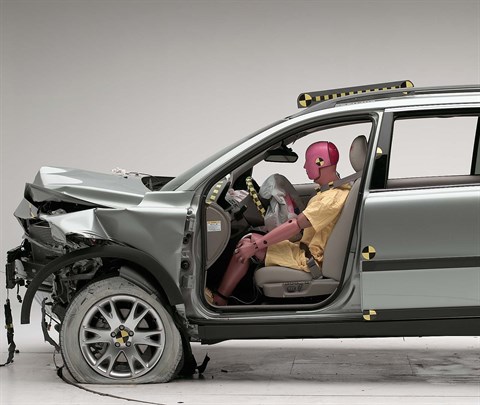
The dummy's position in relation to the steering wheel and instrument panel after the crash test indicates that the driver's survival space was maintained well.
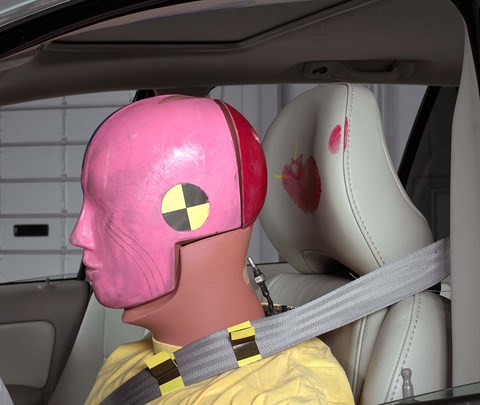
The XC90's head restraints have good geometry, meaning they are high and close to the back of an occupant's head. Moreover, the seatback is specially designed to recline slightly in low-speed rear impacts to minimize the possibility of whiplash injuries.

Intrusion into the driver's space was minimal, and all leg and foot injury measures were low.
Measures of occupant compartment intrusion on driver side
| Evaluation criteria | Measurement |
|---|---|
| Test ID | CEF0305 |
| Footwell intrusion | |
| Footrest (cm) | 7 |
| Left (cm) | 10 |
| Center (cm) | 11 |
| Right (cm) | 11 |
| Brake pedal (cm) | 5 |
| Instrument panel rearward movement | |
| Left (cm) | 2 |
| Right (cm) | 0 |
| Steering column movement | |
| Upward (cm) | -1 |
| Rearward (cm) | 0 |
| A-pillar rearward movement (cm) | 1 |
Driver injury measures
| Evaluation criteria | Measurement |
|---|---|
| Test ID | CEF0305 |
| Head | |
| HIC-15 | 135 |
| Peak gs at hard contact | 27 |
| Neck | |
| Tension (kN) | 1.4 |
| Extension bending moment (Nm) | 8 |
| Maximum Nij | 0.29 |
| Chest maximum compression (mm) | 38 |
| Legs | |
| Femur force - left (kN) | 6.3 |
| Femur force - right (kN) | 5.0 |
| Knee displacement - left (mm) | 3 |
| Knee displacement - right (mm) | 0 |
| Maximum tibia index - left | 0.34 |
| Maximum tibia index - right | 0.37 |
| Tibia axial force - left (kN) | 1.1 |
| Tibia axial force - right (kN) | 2.9 |
| Foot acceleration (g) | |
| Left | 54 |
| Right | 93 |
Roof strength
Rating applies to 2003-14 models
Tested vehicle: 2010 Volvo XC90 4-door 4wd
| Overall evaluation | |
|---|---|
| Curb weight | 4,718 lbs |
| Peak force | 21,274 lbs |
| Strength-to-weight ratio | 4.51 |
